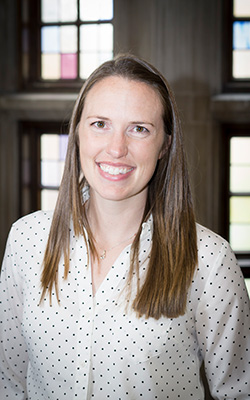Summer Forester

2015 Fulbright U.S. Student Program Grantee
Hometown
Pensacola, FL
Major
Political Science
College
College of Liberal Arts
National and International Scholarships Office: What is your plan for your Fulbright U.S. Student Grant to the Kingdom of Jordan?
Summer Forester: For the first three months of my year in Jordan, I will be enrolled in a language enhancement program in Amman. After that, I will spend nine months conducting research for my dissertation project. In my dissertation, I plan to analyze how national security threats affect the passage of women’s rights policies. I am especially interested in how the Jordanian women’s movement frames their campaigns for women’s rights in relation to national security issues and whether or not these campaigns can influence policymakers. I will collect data on my research project by interviewing policymakers and activists, visiting local archives, and taking in-depth field notes on political events and campaigns.
NISO: What kinds of questions are you asking Jordanian women during your interviews?
SF: I plan to ask questions about both the formal and informal policymaking process in Jordan. While the formal policymaking process, like who signed a bill or who opposed a bill, is relatively straightforward, the informal process is much more nuanced. Through my previous fieldwork in Jordan, Uganda, and Mexico, I found that interviews provided a much richer account of the informal policymaking process than what I could access in parliament transcripts alone. For example, interviewees have the opportunity to describe their relationships with other policymakers and how these relationships influence the outcomes of proposed policies.
NISO: Have you had any unexpected experiences in Jordan?
SF: Before I went to Jordan, I heard about the unfailing kindness, hospitality, and generosity of the Jordanian people. But until I arrived in Amman, I could not fully grasp the magnitude of those descriptions. Once, while buying coffee from a street vendor, a stranger insisted that he pay for my coffee to show my friends and me that we “are most welcome in Jordan.” On a different occasion, a family invited me to their sewing shop where I tried on traditional Jordanian garments (which looked quite funny since I am a lot taller than most of their customers), drank tea, and shared stories of my family back in the U.S. Given the depictions of the Middle East in the U.S. media, I never expected to feel so welcome in Jordan. I am thankful and thrilled that I have the opportunity to return to Jordan and visit the wonderful people who allowed me to be a part of their communities and their families.
NISO: What is one thing a faculty member did for you that helped you with this application?
SF: I found it very difficult to write my grant proposal in a way that a non-technical audience would understand. After writing at least ten drafts of my proposal, I reached out for help. A faculty member told me to pretend I am writing an email to a smart friend. In this email, explain why I am excited about my project, why other people should be interested in the project, and why I deserve grant money to research it. When I stopped trying to write like an academic and started writing about why my project is both interesting and worthwhile, I finally produced a version of my grant proposal that did not sound like a term paper.
NISO: The Fulbright U.S. Student Program requires applicants to make an affiliation in their proposed host in the country. How did you find a host affiliation in Jordan?
SF: Let my experience be a cautionary tale: start working on the affiliation letter early!
My former advisor, Dr. Curtis Ryan from Appalachian State University, has conducted research in Jordan for the past 20 years. He used his extensive network to connect me with a professor at the Center for Strategic Studies at the University of Jordan. I contacted that professor, Dr. Sara Ababneh, about my project and, after exchanging a few emails, she agreed to write a letter of affiliation for me.
I have repeatedly said that it takes a village for a student to apply for a Fulbright grant, and securing the institutional affiliation is, arguably, the best indicator of the group effort required for the application process. My former advisor contacted a number of professors at the University of Jordan who helped me figure out which professor would make the most sense for me to work with in Jordan. Then, I worked closely with my current advisor, Dr. Laurel Weldon, to draft a letter to send to Dr. Ababneh. I lived in Jordan during the summer of 2011 and have written a number of research papers on the Jordanian women’s movement. In my letter, I was able to link my research and personal experiences in Jordan to the research that Dr. Ababneh conducts, and, in the end, I made a strong argument as to why I should be affiliated with the Center for Strategic Studies. The Fulbright application was due in October and I started trying to secure my institutional affiliation in July. The whole process took about two and a half months, and I barely received my affiliation letter in time.
NISO: What is one thing NISO did with you that helped you with this application?
SF: The faculty consultations and interviews that NISO arranged were invaluable to me. I had numerous faculty members from different departments read and comment on my application. Their comments helped ensure that the Fulbright commission would understand my proposal and be interested in my personal statement. I owe a debt of gratitude to those readers and to the NISO Director, Veronica Schirm, for all of her help as I prepared my application.